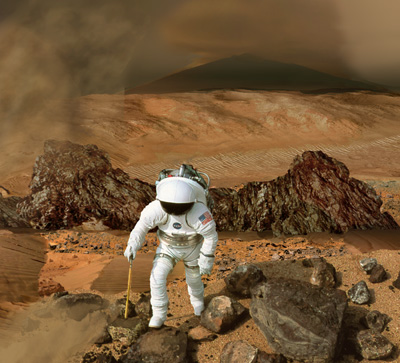

On a mission to Mars, future astronauts will have to leave the protection of Earth’s magnetic field. As they head into deep space, high-energy galactic cosmic rays will pass through the hull of their ship and into their bodies. This might have dangerous—and lasting—consequences for the astronauts’ health.
A new study in rodents has found brain damage and cognitive problems six months after the animals were exposed to space-like radiation at doses similar to what astronauts would encounter. The findings suggest that space radiation could cause astronauts to suffer from memory problems, anxiety, and impaired judgment.
“This is not a deal-breaker,” says coauthor Charles Limoli, a neurobiologist at the University of California, Irvine. “I do not think that during the course of a trip to Mars and back the astronauts will come back with anything remotely similar to full-blown Alzheimer’s. But more mild changes, more subtle changes—they would still be concerning, given the level of autonomy astronauts operate under and the amount of work they have to do.”
The work builds on a study from last year that uncovered problems in mouse brains and behavior six weeks after they were exposed to radiation. Now, the team has found that irradiated rodents falter on more learning and memory tests, and that their problems continue over a longer timeframe.
Compared with other rodents, mice that were exposed to radiation become less interested in investigating new toys, or toys moved to new locations in their enclosures. Irradiated rats became less flexible in responding to changes in their environment.
The rodents also appeared to be more anxious, preferring to remain sheltered within the covered arm of a maze rather than venturing into more open terrain. They seemed to have trouble unlearning or forgetting stressful associations, Limoli says. The animals could not extinguish their fear.
In humans, this might translate to “elevated stress, anxiety and otherwise disadvantageous responses in unexpected or emergency situations,” the team wrote in their paper, published October 10 in Scientific Reports. Astronauts might also suffer memory problems, or struggle with multitasking and making on-the-spot decisions. “And of course there may be some elevated risk for developing some more advanced dementia once they return to Earth,” Limoli says.
He and his colleagues also investigated the brain damage that might underlie these problems. In the areas they examined, the neurons’ dendrites—the spiky structures that receive input from other nerve cells—were studded with “dramatically” fewer spines. These spines help pass signals between neurons, enabling learning and memory. “When we look at those animals that perform the poorest on a given behavioral task, those animals show the largest reductions in these dendritic spines,” Limoli says.
He and his colleagues also found lasting inflammation in the rodents’ brains. This “inflammatory footprint” can rouse immune cells and lead to dendrites becoming pruned and trimmed.
What the team did not find was any sign that the animal’s brains were recovering from their ordeal. “That was actually one of the more surprising findings,” Limoli says. “These changes don’t in fact resolve, or at least not that we can detect.”
In fact, the team’s ongoing experiments suggest that these problems continue to linger. “The actual time that these animals are irradiated here on Earth … is a matter of minutes, and we see changes now that last out to a year, which is astounding,” Limoli says.
In humans, it would likely be months before these detriments became apparent. But until astronauts embark on a deep space mission, we don’t know exactly how people respond to galactic cosmic rays. To prepare, Limoli and his colleagues want to find out which regions in the brain are more vulnerable to space radiation. They are also developing drugs that might help protect the brain from radiation, or help it recover. NASA is also working out how to fortify shielding in areas of the ship where astronauts spend a lot of time, although this would be difficult and expensive.
Still, the team is optimistic. “Our exploration of strange new worlds should not be hampered by the fear of cosmic radiation exposure,” they wrote. Instead, it should inspire us to understand the risks and look for potential solutions.
“I don’t think this means we’re not going to go into space,” says Limoli, “but if we know what’s out there, we can prepare to deal with it much better.”
